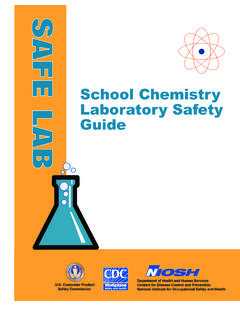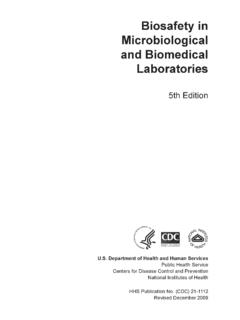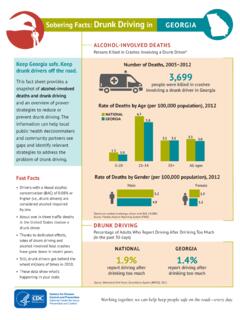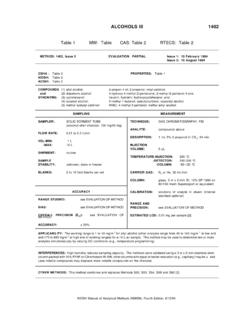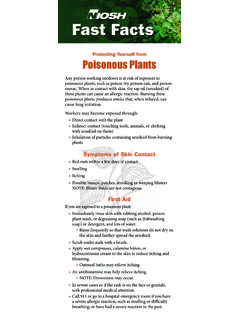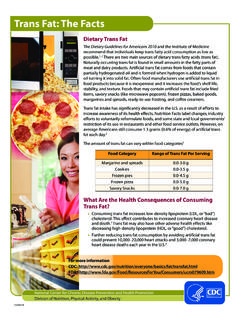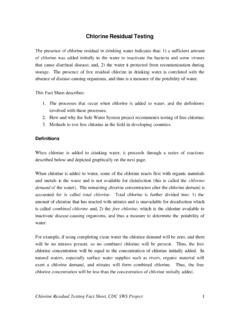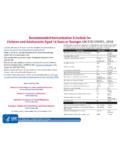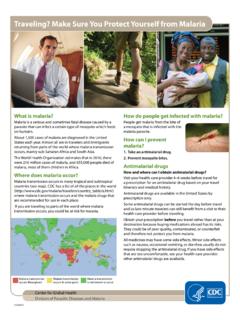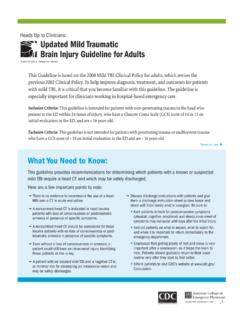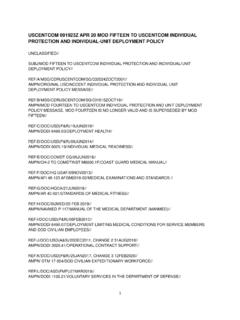Transcription of CARING FOR Your Child’s Concussion
1 WHAT IS A Concussion ? Concussion symptoms may appear during the normal healing process, and will generally improve over time. Most people with a Concussion feel better within a couple of weeks. Some symptoms may appear right away, while other symptoms may not appear for hours or days after the injury . Your child may not realize they have some symptoms until they try to do their usual activities. You may notice changes before your child does. If there are any symptoms that concern you, or are getting worse, your child may need immediate care. Be sure to talk with your child s doctor. HOW WILL MY CHILD FEEL?The head and brain to move quickly back and brain to bounce or twist in the skull from this sudden changes in the brain , and sometimes stretching and damage to the brain child was seen today for a Concussion .
2 Use this handout to help you watch for changes in how your child is feeling or acting, and to help your child feel Concussion is a type of traumatic brain injury from a bump, blow, or jolt to the head or body that causes:Here are symptoms your child may have:PHYSICALTHINKING OR REMEMBERINGSOCIAL OR EMOTIONALSLEEP Bothered by light or noise Dizziness or balance problems Feeling tired, no energy Headaches Nausea or vomiting (early on) Vision problems Attention or concentration problems Feeling slowed down Foggy or groggy Problems with short- or long-term memory Trouble thinking clearly Anxiety or nervousness Irritability or easily angered Feeling more emotional Sadness Sleeping less than usual Sleeping more than usual Trouble falling asleep Schedule a follow up appointment with your child s FOR Your Child s Concussion WHAT STEPS CAN I TAKE TO HELP MY CHILD FEEL BETTER?
3 Early on, limit physical and cognitive (thinking or remembering) activities to avoid causing symptoms to worsen. Get a good night s sleep, and take naps during the day as needed. Find relaxing activities at home (such as reading, drawing, and playing with toys). Avoid activities that put your child at risk for another injury to the head and brain throughout the course or recovery. Return to school gradually. If symptoms do not worsen during an activity, then this activity is OK for your child. If symptoms worsen, cut back on that activity until it is tolerated. Encourage outside time, such as taking short walks. Get maximum nighttime sleep. Tips: Avoid screen time and loud music before bed, sleep in a dark room, and keep to a fixed bedtime and wake up schedule.
4 Reduce daytime naps, or return to a regular daytime nap schedule (as appropriate for their age). Have your child take breaks if their Concussion symptoms worsen. Return to a regular school schedule. Encourage outside time, such as taking a walk or short bike ride and playground SYMPTOMS ARE NEARLY GONEWhen symptoms are mild and nearly gone, return to most regular TO REGULAR NON-SPORTS ACTIVITIESR ecovery from a Concussion is when your child is able to do all of their regular activities without experiencing any Concussion A FEW DAYSAs your child starts to feel better (and within a few days after the injury ), he or she can gradually return to regular (non-strenuous) RIGHT AFTER THE INJURYTake it easy the first few days after the injury when symptoms are more severe.
5 Ask your child s doctor about over-the-counter or prescription medications that are safe to take during recovery to help with symptoms (for example, ibuprofen or acetaminophen for headaches). Limit the number of soft drinks or caffeinated items to help your child get enough tips: If you notice any changes or a return of symptoms, be sure to contact your child s doctor. With the OK from their doctor, your child may begin a return to sports process. Be sure to ask for instructions and share this information with your child s coach and athletic trainer (when available). CARING for Your Child s Concussion : Discharge breaksFewer hours at school or workMore time to take tests or complete tasksLess screen time and time spent reading and writingYour child may need to take a short time off from school (or work, if relevant).
6 Ask the doctor for written instructions about when your child can safely return to school, work, and other activities, such as riding a bike or driving a car. For a short time after a Concussion , your child may need support, such as:If your child is having a difficult recovery, talk with your child s school or employer about support services that may be available. For most people, only short-term changes or support services are needed as they recover from a Concussion . If symptoms persist, talk with your child s doctor about formal support services they recommend. If the injury was work-related, make sure your child reports it right away to their employer and their workers compensation office. WHEN CAN MY CHILD RETURN TO SCHOOL?
7 WHEN CAN MY CHILD RETURN TO SPORTS AND RECREATIONAL ACTIVITIES?Your child should not return to sports and recreational activities:Ask your child s doctor for written instructions about when your child can safely return to sports. Getting approval from a doctor to return to play is important since playing with a Concussion may slow recovery. A repeat Concussion that occurs before the brain has fully healed can increase the chance for long-term problems. While rare, teens are at greater risk of suffering a severe brain injury when a repeat Concussion occurs before the brain has fully healed. It can even be child s doctor should carefully manage and monitor the process of returning to sports and activities. When available, the athletic trainer for your child s sports program or school should be involved.
8 On the same day of the injury . Until they get the OK from a doctor with experience evaluating CARING for Your Child s Concussion : Discharge IF I DON T FEEL LIKE MY CHILD IS GETTING BETTER? A headache that gets worse and does not go away Significant nausea or repeated vomiting Unusual behavior, increased confusion, restlessness, or agitation WHERE CAN I LEARN MORE ABOUT Concussion ?Information in this handout is based on CDC s Guideline on the Diagnosis and Management of mild traumatic brain injury Among Children. More information on the Guideline and Concussion , as well as tips to help your child feel better, information about returning to school, and the return-to-play process can be found at The information provided in this handout is not a substitute for medical or professional care.
9 Questions about diagnosis and treatment for a Concussion should be directed to your child s healthcare your child s Concussion , call 9-1-1 if your child develops:If you do not feel like your child is getting better, talk with his or her doctor. Keep track of your child s Concussion symptoms, and share them with the doctor. This may help the doctor identify the best treatment for your child s symptoms. You may also need to take your child to see a specialist experienced in treating brain injuries. Ask your child s doctor for names of brain injury specialists in your area. CARING for Your Child s Concussion : Discharge ARE THE SIGNS OF A MORE SERIOUS brain injury ? Drowsiness or inability to wake up Slurred speech, weakness, numbness, or decreased coordination Convulsions or seizures (shaking or twitching) Loss of consciousness (passing out)
